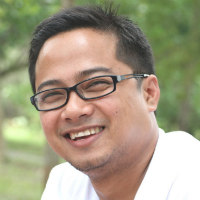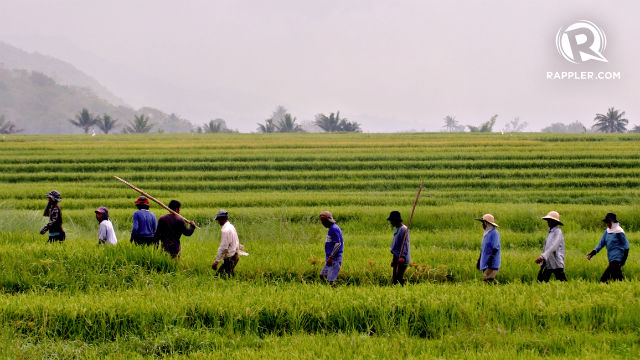SUMMARY
This is AI generated summarization, which may have errors. For context, always refer to the full article.
 What’s your criteria for electing people into office? Is it the candidates’ track records? Their position on issues that will truly uplift and change the situation of the populace? How family names and public stature?
What’s your criteria for electing people into office? Is it the candidates’ track records? Their position on issues that will truly uplift and change the situation of the populace? How family names and public stature?
Here’s a thought as we celebrate Earth Day today: maybe one of the criteria we should consider is the candidates’ stand on food security and how to forge a future where everyone has enough to eat and where food producers have right to utilize the vast resources our Mother Earth provides. Translated into platform jargon, that’s access to land and land use policy issues.
A new formula for development
In 2012, the gross domestic product (GDP) of the Philippines was pegged at 6.6 percent, outperforming other growth rates in the region except China. However, this growth rate is propelled by the services and industry sectors—not by the agriculture or rural development sector, despite the fact that majority of Filipinos principally derive their livelihood from agriculture, forestry, or fisheries.
According to NSCB (National Statistical Coordination Board), fisherfolk and farmers registered the highest poverty incidence with 41.4 and 36.7 percent, respectively. Ironically, our food producers are the ones who cannot afford to eat.
With these statistics, it is evident that our country’s development model does not cater to the majority of Filipinos. In order to have genuine economic growth, our government needs to review its development framework and institutionalize mechanisms aimed at improving the socio-economic situation of the people that mainly derive their livelihood from agriculture.
He who tills the land…
Sufficient food, worthwhile jobs and healthy environment are all tied to access to land and its resources. Studies reveal that access to land has positive effects on educational attainment, health status and income levels of the poor in rural areas. The incidence of poverty is higher in regions where land ownership is concentrated in the hands of the few.
As it is, the people who grow our food—the poorest of the poor, those on whom this country relies to feed the rest of the country, and indirectly, spur its development—are being denied access. Under the Comprehensive Agrarian Reform Program (CARP), there are 961,974 hectares of agricultural lands still for distribution. There are at least one million landless farmers who have been waiting for decades to till their own lands. Failure to fast track distribution is due to government inefficiency and landlord resistance, threatened further by big agribusiness interests for the biofuels industry instead of food cultivation.
For small farmers to have access to land, Congress needs to secure its budget for land acquisition and distribution until all agricultural lands are distributed pursuant to the 1987 Constitution. The pro-active role of the Congressional Oversight Committee on Agrarian Reform (COCAR) is needed to expedite CARP’s implementation.

Better land use
In 2010, the Philippine population was placed at 94 million with an average annual growth of 2.6 percent. With this growth rate, our country expects a population of 150 million in 25 years. This will definitely increase the demand for land. This poses a problem, given the finite character of our land and resources, which are constantly subjected to conflicting demands– and even abuse and misuse of various interest groups.
Indiscriminate conversion of agricultural lands into non-agricultural uses threatens our food security. Agricultural lands for food production need to be preserved and set aside by the State. We need a national framework on land use planning that institutionalizes land use and physical planning as a mechanism in identifying and evaluating appropriate land use and allocation patterns in the country. It is for this reason that we need to have a National Land Use Act (NLUA). It intends to segregate lands according to four major land use categories namely: protection; production; settlement; and infrastructure development guided by the physical plan over development plan framework.
This important piece of legislation has been shelved in Congress for nearly 20 years. For the past six Congresses, only a few of our legislators have undertaken the arduous task of NLUA passage amidst oppositions from the influential sectors of the society.
As we celebrate Earth Day Today, let us ask ourselves: are the people on your “to-vote for“ list ready to take these on? – Rappler.com
Anthony “Tone” Marzan is the executive director of KAISAHAN since 2010. This year marks his decade of service to KAISAHAN where he has also acted as media officer, policy advocacy officer and member of the Management Committee since 2009. A Political Science Major from the Polytechnic University of the Philippines, Tone has expertise on agrarian reform and governance issues and persistent in pursuing land related advocacies. He also serves as paralegal and advocate of major land cases.
This piece is part of Oxfam’s GROW campaign which calls for better ways to grow, share and live together, a campaign for the billions of us who eat food and over a billion of men and women who grow it.
Oxfam is an international confederation of 17 organisations networked together in more than 94 countries, as part of a global movement for change, to build a future free from the injustice of poverty. In the Philippines, Oxfam works with poor people to sustain their livelihoods, and reduce their risks to natural and human-made disasters and strives to enable poor people to have a voice in economic issues affecting them. Oxfam also supports poor women as they lead in transforming unequal social and economic relations.
Add a comment
How does this make you feel?
There are no comments yet. Add your comment to start the conversation.